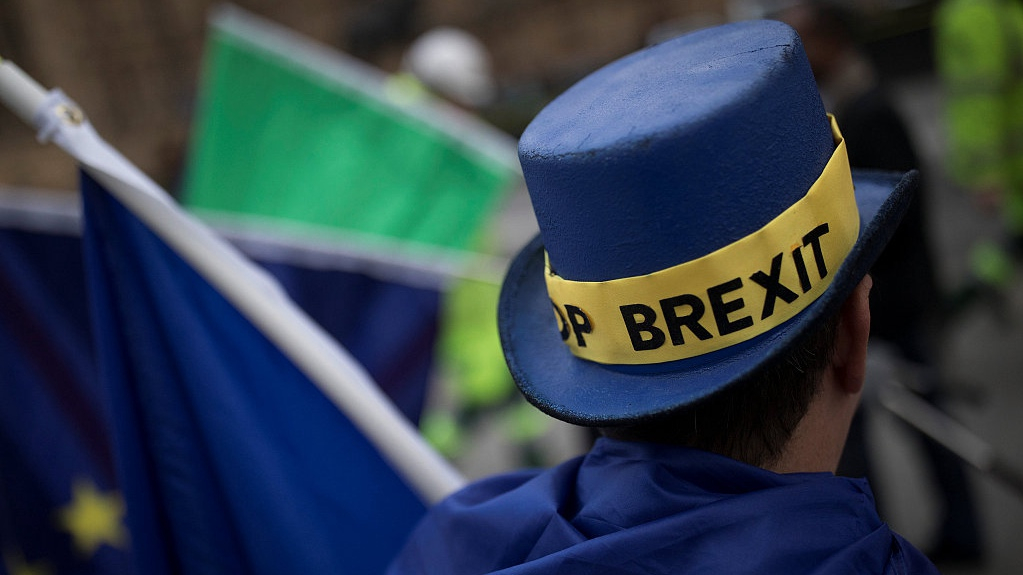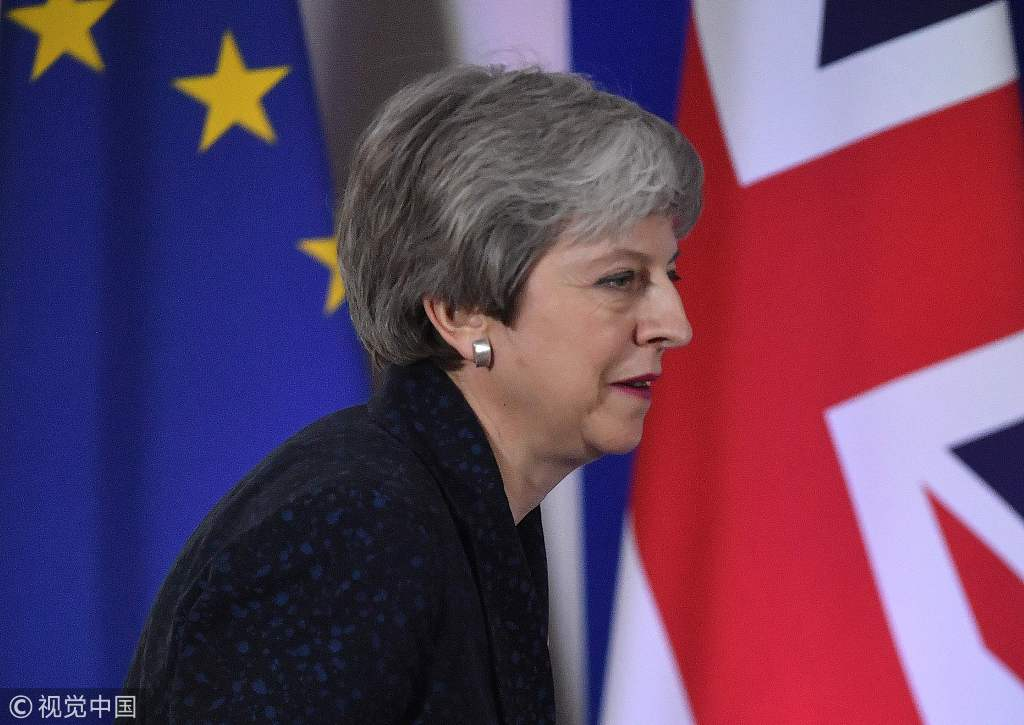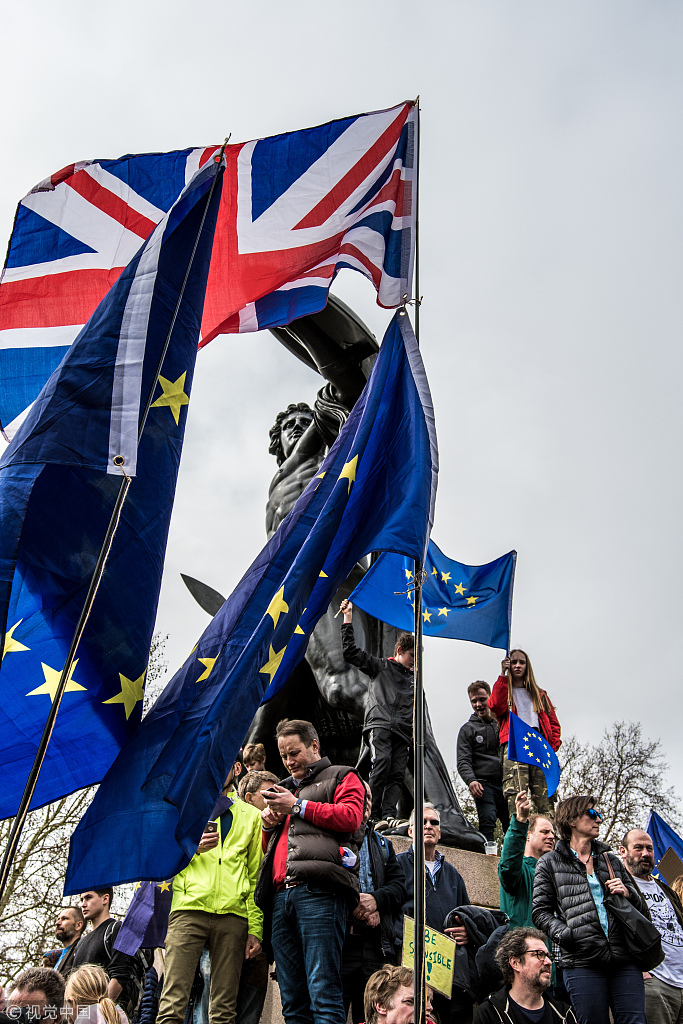
Opinion
15:08, 25-Mar-2019
The Brexit game: New players, new strategies, new challenges!
Updated
09:07, 26-Mar-2019
Richard Fairchild

Editor's note: Richard Fairchild is an associate professor of finance at the School of Management at the University of Bath. The article reflects the author's opinions, and not necessarily those of CGTN.
On March 14, UK MPs voted overwhelmingly to ask the EU for a delay to the Brexit process. As a result, the UK won't leave the EU on March 29 as planned. The EU agreed to extend the deadline to May 22 if UK Prime Minister Theresa May's deal is passed before April 12. But if her deal is rejected or not voted on, Britain will head for a no-deal exit on April 12 unless it finds an alternative plan.
May is involved in a three-player bargaining game over the terms of Brexit. That is, May is acting as a "go-between," negotiating, as an agent of the British Public, with the EU. Bargaining game theory demonstrates that she had been required to compromise to try to gain agreement for her deal with the conflicting aims of both of these players in the game (the EU and the British Public, who are represented by the British MPs).

UK Prime Minister Theresa May arrives at a press conference in Brussels, Belgium, March 22, 2019. /VCG Photo
UK Prime Minister Theresa May arrives at a press conference in Brussels, Belgium, March 22, 2019. /VCG Photo
Having secured an agreeable deal with the EU, she has been unable to get it agreed in the UK House of Commons. In recent weeks, political games and machinations have been mind-boggling!
In some ways, the outcome of May's latest meeting with EU leaders on March 21 has strengthened her hand in her negotiations with the British MPs. The EU Council, led by Donald Tusk, has effectively seized control of the process from May. The original deadline for Brexit, this coming Friday, March 29, has been pushed back.
The EU has agreed with the following options:
a) If May can get her twice-rejected deal through when she takes it back for a third "meaningful" vote to the Commons this coming week, the EU will allow an extension to Brexit until May 22 so that Britain can get the procedures and legislation in place in order to leave.
b) If her deal is rejected for the third time this week, Mrs May will be forced to instigate Brexit on April 12, either with a new deal, or no-deal.
c) Revoke Article 50 altogether (ie reject Brexit, and remain in the EU).
d) The EU has allowed consideration of a longer extension, beyond May 22, but only if Britain agrees to put candidates forward for the EU elections on May 23: that is, for a “Club" that Britain is trying to leave!
Naturally, May has made it clear that we will not be putting MPs up for the EU elections. So, in the terms of game theory, the EU has offered an irrelevant option d that they know will not be acceptable to Britain, focusing us onto opinions a, b, or c. In game theory, the offering of an irrelevant inferior option is known as the Decoy Effect, designed to push the player towards one of the other relevant options!

Thousands of protesters take part in the Put It To The People March in London, UK, March 23, 2019. /VCG Photo
Thousands of protesters take part in the Put It To The People March in London, UK, March 23, 2019. /VCG Photo
In one ironic way, Theresa May's weakness in her meeting with the EU becomes her strength in her bargaining position with the British MPs in trying to get her deal through this time. The EU, in seizing control from the British Prime Minister, has effectively removed May from the game as a meaningful player!
The game has now effectively become a two-player game, being played out directly between Britain and the EU, without any meaningful impact from May anymore! The prospect for the deal has been strengthened as the alternative (crashing out with no deal) becomes stronger due to the "red line" of the European elections on May 23 creating bargaining pressure.
But has this really strengthened the prospect for May's deal? Game theorists must consider all of the potential options in the game. An interesting outcome of all of these political wrangling and maneuverings over the last months is the strengthening emergence of a political will among the British people, beyond the official institutions of Parliament. There are several new groups of competing players in town!
The Brexiteers Direct Action Group called for protests in favor of Brexit on March 22. Furthermore, there are those who are pushing for a second public referendum on Brexit: protests took place in London on March 23, with a public march by the "People's Vote" campaign.
Finally, there is a group that is pushing for Brexit to be scrapped altogether. This group has just placed an online petition for Brexit to be stopped on the website: the "Revoke Article 50" petition. In its first two days, it already has four million signatures! According to Metro online, this is a record level of sign-ups for any online petition. May has said that she will not countenance revoking Article 50 (which would stop Brexit). However, as the Metro points out, the number of signatures exceeds 100, 000, the threshold required for it to be debated in Parliament.
It is clear that the Brexit game rages on, with new strategies, and new players, constantly emerging and entering the arena!
(If you want to contribute and have specific expertise, please contact us at opinions@cgtn.com.)

SITEMAP
Copyright © 2018 CGTN. Beijing ICP prepared NO.16065310-3
Copyright © 2018 CGTN. Beijing ICP prepared NO.16065310-3